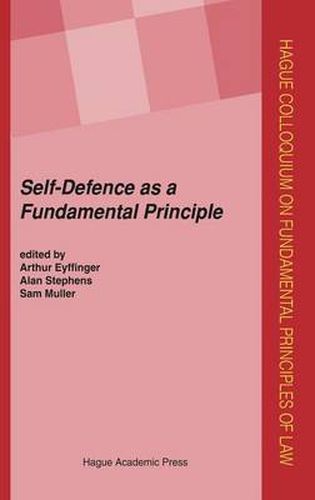Readings Newsletter
Become a Readings Member to make your shopping experience even easier.
Sign in or sign up for free!
You’re not far away from qualifying for FREE standard shipping within Australia
You’ve qualified for FREE standard shipping within Australia
The cart is loading…






This title is printed to order. This book may have been self-published. If so, we cannot guarantee the quality of the content. In the main most books will have gone through the editing process however some may not. We therefore suggest that you be aware of this before ordering this book. If in doubt check either the author or publisher’s details as we are unable to accept any returns unless they are faulty. Please contact us if you have any questions.
Within societies, on a national level, self-defence may be used as a defence against the use of force in order to prevent crime against oneself, a fellow human being or even property. Between societies on the international level, self-defence was traditionally linked to the concept of armed attack. However, in today’s world, new forms of aggression, the concept of collective security, and an increasing interaction between national and international law necessitate a reassessment of the concept of self-defence. The first session of the Hague Colloquium on the Fundamental Principles of Law, on the topic of self-defence and honouring Shabtai Rosenne, the first Laureate of the Hague Prize for Intenational Law, brought together experts from both academic and professional circles to debate the notion of self-defence in the world of today. Both the Colloquium and this subsequent publication make a valuable contribution to the development of the law by recognising the sources of the principle of self-defence, and the theories underlying it, by following its path of evolution and by reassessing its current status. The essays are accompanied by a remarkably full and useful bibliography and by documentary materials, many of which are difficult to obtain elsewhere.
This book will contribute constructively to stimulating scholarship and research in the field of self-defence; it provides food for thought, and will hopefully inspire more colloquia and publications on the topic.
Arthur Eyffinger is Director of JUDICAP, a research centre and publishing house in the field of internationalism. Alan Stephens is Director of Research at the Clemens Nathan Research Centre. Sam Muller is Director of the Hague Institute for the Internationalisation of Law (HiiL).
$9.00 standard shipping within Australia
FREE standard shipping within Australia for orders over $100.00
Express & International shipping calculated at checkout
This title is printed to order. This book may have been self-published. If so, we cannot guarantee the quality of the content. In the main most books will have gone through the editing process however some may not. We therefore suggest that you be aware of this before ordering this book. If in doubt check either the author or publisher’s details as we are unable to accept any returns unless they are faulty. Please contact us if you have any questions.
Within societies, on a national level, self-defence may be used as a defence against the use of force in order to prevent crime against oneself, a fellow human being or even property. Between societies on the international level, self-defence was traditionally linked to the concept of armed attack. However, in today’s world, new forms of aggression, the concept of collective security, and an increasing interaction between national and international law necessitate a reassessment of the concept of self-defence. The first session of the Hague Colloquium on the Fundamental Principles of Law, on the topic of self-defence and honouring Shabtai Rosenne, the first Laureate of the Hague Prize for Intenational Law, brought together experts from both academic and professional circles to debate the notion of self-defence in the world of today. Both the Colloquium and this subsequent publication make a valuable contribution to the development of the law by recognising the sources of the principle of self-defence, and the theories underlying it, by following its path of evolution and by reassessing its current status. The essays are accompanied by a remarkably full and useful bibliography and by documentary materials, many of which are difficult to obtain elsewhere.
This book will contribute constructively to stimulating scholarship and research in the field of self-defence; it provides food for thought, and will hopefully inspire more colloquia and publications on the topic.
Arthur Eyffinger is Director of JUDICAP, a research centre and publishing house in the field of internationalism. Alan Stephens is Director of Research at the Clemens Nathan Research Centre. Sam Muller is Director of the Hague Institute for the Internationalisation of Law (HiiL).